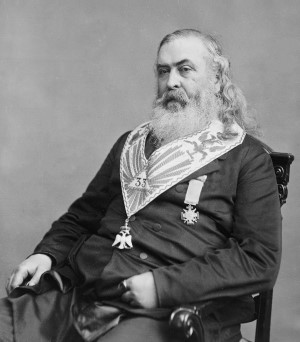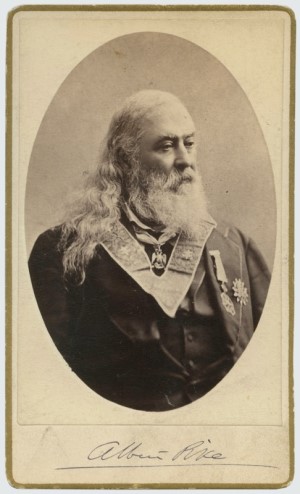Albert Pike
Best known as: author, lawyer, general, and judge
Born: December 29, 1809 in Boston, Massachusetts
Died: April 2, 1891 in Washington, D.C.
Resting place: House of the Temple, Washington, D.C.
Biography:
Albert Pike was born in Boston in 1809. His parents were named Benjamin and Sarah, and his ancestors had settled in Massachusetts in 1635. He grew up in Newburyport and Framingham, Massachusetts. Starting at age 14, he worked as a teacher in various Massachusetts towns, including Gluocester, Bedford, Fairhaven, and Newburyport. At age 15, he was admitted to Harvard, although he chose not to attend for financial reasons. Instead, he educated himself, reading widely, writing poetry, and learning Hebrew, Latin, Greek, and French.
In 1831, when he was 21 years old, Pike decided to leave Massachusetts and begin a life of adventure out west. He lived in Nashville, Tennessee and then St. Louis, Missouri before joining a hunting and trading expedition to Taos, New Mexico. In an unfortunate incident, his horse ran away and he was forced to walk the rest of the way, a 500-mile trip. Next, he moved to Santa Fe, and from there he joined a beaver trapping expedition to the Staked Plains, a region of eastern New Mexico and northwestern Texas. From there, he trekked 1,300 miles to Fort Smith, Arkansas.
Beginning in 1833, he settled in Arkansas and began a career as a writer and lawyer. Initially, he worked as a teacher, submitting articles to the Arkansas Advocate in his spare time under the pen name "Casca." He was soon offered a job at the newspaper, which he accepted. In 1834, he bought the newspaper. He maintained an interest in poetry and published his first collection of poems, called "Prose Sketches and Poems Written in the Western Country," in 1834. He also married Mary Ann Hamilton this same year. They would eventually have six children together. Soon he made the switch to law as his primary career, passing the bar in 1837 and selling the newspaper. He proved to be an excellent lawyer, representing clients in a variety of different courts, including the U.S. Supreme Court. He specialized in representing Native Americans in disputes with the federal government, arguing before the U.S. Supreme Court on behalf of the Creek, Choctaw, and Chickasaw people. He also held the lucrative position of receiver for the Arkansas State Bank. Additionally, he wrote about various law-related topics, publishing a guide for lawyers called the Arkansas Form Book and serving as the first reporter of the Arkansas Supreme Court, a job that required him to summarize, publish, and index court rulings.
When the Mexican War began in 1846, Pike enlisted in the military. He was commissioned a captain in a cavalry regiment called the Regiment of Arkansas Mounted Volunteers. He fought admirably in the Battle of Buena Vista. He did not get along with his commanding officer, John Roane. Their tensions culminated in a duel, during which several shots were fired but neither man was injured. Pike was discharged in 1847 and returned to his legal career.
In 1850, Pike became a Freemason, a pursuit that would become possibly his greatest passion. He helped to found St. Johns' College in Little Rock, Arkansas and also helped to establish an Arkansas chapter of Masons. In 1853 he became Grand High Priest of this chapter, and in 1859 he was elected Sovereign Grand Commander of the Southern Jurisdiction, a position that he held for the rest of his life.
Politics was another interest of Pike's. He advocated for the construction of a transcontinental railroad from New Orleans to California, writing a series of newspaper essays and even moving temporarily to New Orleans to further this goal. He attended the Southern Commercial Convention in 1854, where he expressed his opinion that the southern states should try to remain in the Union but would be within their rights to leave if mistreated by the northern states. Pike became a member of the Know-Nothing party and helped to found its Arkansas branch. In 1856 he attended the Know-Nothing party's national convention. He was a proponent of slavery, and he left the party when it did not adopt an explicitly pro-slavery stance. He was also a proponent of the idea of expelling free blacks from the country, signing a pamphlet endorsing this idea.
In 1861, Pike became more vocal in his support for secession. He published a pamphlet titled "State or Province, Bond or Free?" and wrote a song called "Dixie to Arms!" When the Civil War broke out, he served as emissary to the Native American tribes. He negotiated several treaties in which tribes such as the Cherokee agreed to support the Confederacy, and the Confederacy promised to create a separate Native American nation if it won the war. In November 1861 Pike became a brigadier general in the Confederate army. He was based in Indian Territory and trained three regiments of Native American cavalry. He had mixed results as a general, initially appearing victorious at the Battle of Pea Ridge but suffering defeat in a later counterattack. He again had difficulty getting along with his superior officer, General Thomas Hindham, and complained about him in a letter to President Jefferson Davis. Pike was also accused of mishandling money and supplies, and his cavalrymen were accused of scalping enemy soldiers. Due to these disagreements, Pike resigned from the Confederate army in July 1862. That November, he was arrested for insubordination and treason, but the charges were dropped and he returned hom to Arkansas.
The following year, he was appointed an Associate Justice of the Arkansas Supreme Court. After the war ended, he moved to New York City and then Canada, before returning to Arkansas again and resuming his legal career. He remained somewhat politically active, arguing on behalf of Arkansas Governor Elisha Baxter during an electoral dispute with gubernatorial candidate Joseph Brooks. Pike also advocated against suffage for blacks and may have served as the Chief Judicial Officer of the Ku Klux Klan. In 1867 he moved to Memphis, Tennessee, where he started a new law practice and became editor of the Memphis Appeal. In 1870 he moved to Washington, D.C., where he practiced law with a new partner and edited a newspaper called The Patriot.
In his later life, Pike continued to be a dedicated and active Freemason, publishing numerous books and rewriting many of the Masonic rituals. He also became interested in spiritualism and Indian philosophy. He learned Sanskrit and translated numerous works. He died in 1891 at the age of 81 at the Masonic Temple in Washington, D.C.
Physical characteristics:
Albert Pike was distinctive in appearance, standing 6 feet tall and weighing 300 pounds. He had shoulder-length hair and a long, bushy beard.
Personality:
Pike seems to have been free-spirited, independent-minded, adventurous, and eccentric. He liked to do things his own way and was not at his best in situations that required him to cooperate with or take orders from others. He was very intellectual, with a wide variety of interests and talents. He was also very energetic and determined.
Fun facts:
- Received an honorary master's degree from Harvard in 1859
- Was the first author to write about the region between Arkansas and New Mexico
- Has been called "one of the most remarkable figures in American history"
- His son joined the Confederate army as well and died in the war
Publications:
- Prose Sketches and Poems Written in the Western Country (1834)
- The Arkansas Form Book (1842)
- Maxims of the Roman Law and Some of the Ancient French Law, as Expounded and Applied in Doctrine and Jurisprudence
- The Meaning of Masonry (1858)
- Hymns to the Gods and Other Poems (1872)
- Indo-Aryan Deities and Worship as Contained in the Rig-Veda (1872)
- Morals and Dogma of the Ancient and Accepted Scottish Rite (1872)
- Book of the Words (1874)
- Reprints of Old Rituals (1879)
- Esoterika - The Symbolism of the Blue Degrees of Freemasonry (1887)
- Gen. Albert Pike's Poems (1900) (published posthumously)
- Lyrics and Love Songs (1916) (published posthumously)
Quotes:
- "What we have done for ourselves alone dies with us; what we have done for others and the world remains and is immortal."
- "Faith begins where Reason sinks exhausted."
- "The sovereignty of one's self over one's self is called Liberty."
- "One man is equivalent to all Creation. One man is a World in miniature."
- "That which causes us trials shall yield us triumph: and that which make our hearts ache shall fill us with gladness. The only true happiness is to learn, to advance, and to improve: which could not happen unless we had commenced with error, ignorance, and imperfection. We must pass through the darkness, to reach the light."
- "The freest people, like the freest man, is always in danger of re-lapsing into servitude. Wars are almost always fatal to Republics. They create tyrants, and consolidate their power."
- "We seem never to know what any thing means or is worth until we have lost it."
- "Constitutions and Laws, without Genius and Intellect to govern, will not prevent decay. In that case they have the dry-rot and the life dies out of them by degrees."
- "If his country should be robbed of her liberties, he should still not despair. The protest of the Right against the Fact persists forever."
Pictures:

Pike c. 1850

Pike in Masonic regalia, by Matthew Brady

Signed photo of Pike by Matthew Brady
